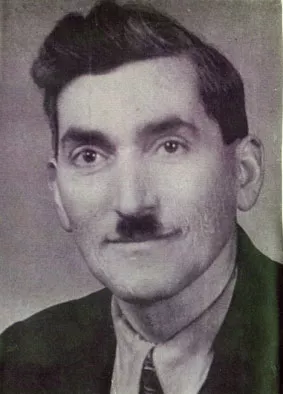Samuel Glasberg
Here is my father Samuel Glasberg. This is the only photo which I still have of him. And it’s only a copy sent by my brother Herman Glasberg.
My father, Samuel Glasberg, was born in 1900 in Straja, near Radauti. He only graduated primary school, 7 grades. My father took part in both world wars, as a soldier during World War I, and as a deportee to Transnistria under the Antonescu regime during World War II. He was only a soldier during World War I, but he was promoted to corporal - that was it, he never made it past corporal. He fought in the mountains, I know for a fact that he actually reached Marasesti, but I don't know too many details about the war period, I didn't hear or learn any stories about it. My father was kind by nature, I can't imagine him taking aim to shoot someone else.
We spoke German at home. I spoke German fluently. I'm still pretty good at it even now. I belong to the generation that lived and suffered - even if only as a child - the errors of World War II and the times that followed in the wake of it, which were ridden with poverty, precarious living conditions, lack of education and so on. I believe 99% of the Jewish population in Radauti was deported to Transnistria. We traveled through Moghilev, and were taken to Djurin [nowadays Dzhurin, in the Vinnytsya region in Ukraine] in Transnistria. We were six all in all, the five of us - three sons and our parents.
Shortly after we arrived there, my father was caught by the Germans, by the SS troops, and was arrested while simply walking in the street, taken to the concentration camp in Bug, the forced labor camp.
Let me tell you a little about the return home. With the liberation and the advancing of the Russian troops, my father returned from the concentration camp, and he came to Djurin, where he knew we were. So the Germans took my father, he was taken to a Nazi camp of the SS troops, a forced labor camp. I know a few episodes that happened there - in any case, its purpose was extermination as well. Through forced labor and also through the abuses that have been and are still committed throughout the world when some human beings that have weapons and power face another human being who is powerless and their prisoner, they believe to be superhuman.
Let me recount a single episode my father told me, and I believed him, for he wasn't the kind of person to fabricate stories. They were eating - meaning they were sitting cross-legged around a so-called square, of course, there was a barbed wire fence behind them and they sat around that square with some sort of used military mess kettles and a spoon, and they ate first, second and third course consisting of a single dish, a very thin soup made from potatoes, vegetable marrow, beet, and so on - I've heard stories of soups that in any case do not belong to regular human cuisine, rather to that for animals. My father was sitting next to a good friend of his from Radauti, a tailor - he was a professional tailor in Radauti - and while they were eating an SS sergeant appeared, and the rule was that they should stand up - as a sign of respect for the respective officer. The man sitting next to my father simply wasn't wearing his glasses, didn't notice him; they were generally starving, and when that food was brought they would rush to sip it, and he wasn't paying attention, and in the instant when that man had the spoon to his mouth the sergeant drew his pistol, and instead of swallowing the soup, the man was shot in the mouth by the sergeant; of course he died instantly. This is one of the episodes my father told me about the Bug concentration camp. But there were countless such episodes. Human beings didn't count for the Nazis. Even among them, there were some who, in turn, thought themselves to be elite citizens at home - and, like everywhere, the war, the weapons, the conceptions inoculated in people's consciences can turn even educated human beings, as many of the German officers and sub-officers were, into beasts.
They mainly worked at building roads, because this entire region: the south of Ukraine, Ukraine itself, Russia in general, the Russian steppes had very poor infrastructure - these were muddy roads; they carried stone, laid it, dug ditches, built bridges, and so on. They worked shifts of 12-14 hours a day, so tiresome that many would collapse on the way back from work - the elderly or the sick. God willed that father, who was a more robust individual, raised in the countryside, as I said, at Straja, and accustomed to hard work ever since he was only a child, should survive the efforts there, but with consequences, nevertheless. Meaning that he managed to return home, but he suffered all his life from angina pectoris, an ailment that he contracted there, and that's also what caused his early demise - he died at home at 59, in Radauti.
After liberation, we remained in Djurin for a few years, because my father managed to find some jobs, earn some money. There was a sugar factory in the neighborhood - I don't know for sure whether it was in Moghilev or in a closer locality -, and I know that my father, as he had a very legible and calligraphic handwriting, succeeded in getting hired there - temporarily, of course. Our wish was to return home immediately. We had our house in Radauti and it was meaningless to stay.




